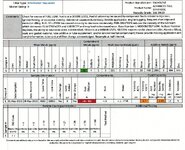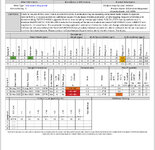You are using an out of date browser. It may not display this or other websites correctly.
You should upgrade or use an alternative browser.
You should upgrade or use an alternative browser.
kirkland 5w-30, 3800 miles, Acura RDX 2020
- Thread starter tolian21
- Start date
That's a dose of fuel for sure. It appears the wear is low though. Are you in the cold north?
Nope, in NJ and this oil was run through summer. I first thought there is something wrong with my engine, but I see a lot of reports for Honda 2.0t with similar dilution. I now buy cheapest 5w-30 synthetic and change every 3-4k miles.
Interesting, is it just straight gas direct injection or combo port injection?Nope, in NJ and this oil was run through summer. I first thought there is something wrong with my engine, but I see a lot of reports for Honda 2.0t with similar dilution. I now buy cheapest 5w-30 synthetic and change every 3-4k miles.
Straight DI, using 93 octane also as recommended.Interesting, is it just straight gas direct injection or combo port injection?
The level of fuel dilution mostly has to do with how the engine was operated recently, since dilution increases when the engine is cold, but goes down when the oil is hot as the fuel boils off. Notice how your UOA from August had less dilution than the other two despite twice the mileage.Nope, in NJ and this oil was run through summer.
Changing the oil more often doesn't really help with dilution, though it could help a bit with shear-thinning. Using a thicker grade is a good move, but I'd base the OCI on factors other than fuel dilution.
I’m
In last two oil changes oil was changed after 40-50min highway drive.
The level of fuel dilution mostly has to do with how the engine was operated recently, since dilution increases when the engine is cold, but goes down when the oil is hot as the fuel boils off. Notice how your UOA from August had less dilution than the other two despite twice the mileage.
Changing the oil more often doesn't really help with dilution, though it could help a bit with shear-thinning. Using a thicker grade is a good move, but I'd base the OCI on factors other than fuel dilution.
In last two oil changes oil was changed after 40-50min highway drive.
If that's an above average trip length for you, it would reduce the dilution, but probably not that much. It might take a few hours with a warm engine for fuel dilution to drop a lot.In last two oil changes oil was changed after 40-50min highway drive.
When highway driving, are you allowing the trans to shift to the highest gear (for best fuel economy)?In last two oil changes oil was changed after 40-50min highway drive.
Next time you do a change, try manually selecting a lower gear and do a few WOT (wide open throttle) pulls.
On my 1.5 DI non-turbo Honda, I have a manual transmission so I just keep it in 4th while doing a few pulls.
Last week I noticed I had smelly oil (lots of short trips in cooler weather).
After an aggressive drive, no more fuel smell on the dipstick (also running high octane).
Just normal boring driving, nothing aggressive. Maybe next time will drive in high RPMs to get temp up before oil change.When highway driving, are you allowing the trans to shift to the highest gear (for best fuel economy)?
Next time you do a change, try manually selecting a lower gear and do a few WOT (wide open throttle) pulls.
You should be able to run 87 octane? As long as you're not full throttling it everywhere there's little reason to pay extra for 93. I'd try 87 & see if the fuel contamination is reduced. 87 is easier to burn off than 93. Over 5% fuel is time to dump so you're doing a good job of that. You could also try a 0w-40 or 5w-40 grade & run it out a bit further if you'd like some viscosity buffer. Just try to see what works for you. Thanks for sharing.Straight DI, using 93 octane also as recommended.
Yes, 87 is allowed but 93 is recommendedYou should be able to run 87 octane?
per manual. Someone said higher octane reduces fuel dilution, but maybe its not…. Doubt it will make it worse though…. i was also thinking about 5w-40
That's great to hear!Yes, 87 is allowed but 93 is recommended
per manual. Someone said higher octane reduces fuel dilution, but maybe its not…. Doubt it will make it worse though…. i was also thinking about 5w-40
Some might have had success using higher octane. But I can't help but to think that a more ignitable fuel could reduce the fuel in oil. Just see what you'd like to try & test the results.
The level of fuel dilution mostly has to do with how the engine was operated recently, since dilution increases when the engine is cold, but goes down when the oil is hot as the fuel boils off. Notice how your UOA from August had less dilution than the other two despite twice the mileage.
Changing the oil more often doesn't really help with dilution, though it could help a bit with shear-thinning. Using a thicker grade is a good move, but I'd base the OCI on factors other than fuel dilution.
- This level of fuel dilution is from Direct Injection not driving operation.. It's the nature of the beast.
- Changing oil will not stop fuel dilution but it will remove fuel contaminated oil.
- Fuel dilution is probably one of the single most important reasons to decide if running the oil out further is possible. Fuel is not an engine lube & at certain levels cause damage.
It worked in my application and for a few other Honda DI owners on the forum as well.Someone said higher octane reduces fuel dilution, but maybe its not…. Doubt it will make it worse though…. i was also thinking about 5w-40
I'm also running a thicker oil, closer to a 5w40ish with no problems to date (over 2 years).
The rate of fuel dilution is highly dependent on engine temperature/trip duration, as well as engine load and rpm (higher rates of dilution at high load/rpm).This level of fuel dilution is from Direct Injection not driving operation.. It's the nature of the beast.
The concentration of fuel in the oil will hit a steady state level shortly after an oil change. The rate of dilution eventually matches the rate that the fuel evaporates and leaves the crankcase through the PCV system or past the piston rings.
- Changing oil will not remove fuel dilution but it will remove fuel contaminated in the oil.
- Fuel dilution is probably one of the single most important reasons to decide if running the oil out further is possible. Fuel is not an engine lube.
In the chart I posted above, the fuel concentration is near steady state after around 10 hours, which might be ~600 miles, so if you wanted to limit the maximum fuel dilution, you'd have to change the oil at least every 600 miles in this example. Whether the oil gets changed at 3k or 6k miles isn't really going to matter. The fuel concentration will be around the same at 6k miles as it is at 1k.
Whether the oil gets changed at 3k or 6k miles isn't really going to matter. The fuel concentration will be around the same at 6k miles as it is at 1k.
TBN is twice as high when oil is changed at 3-4k vs 8k. Its true that TBN of 2 is still OK, but like to have higher TBN than 2 when changing oil.
Last edited:
I know that some vehicles will reach a fuel dilution "max" & stay there even while adding more miles. Is this one of those vehicles? Don't know b/c not enough testing. But from prior testing it appears that almost double the miles showed 4% showing that it might have reached the "max" fuel dilution.The rate of fuel dilution is highly dependent on engine temperature/trip duration, as well as engine load and rpm (higher rates of dilution at high load/rpm).
The concentration of fuel in the oil will hit a steady state level shortly after an oil change. The rate of dilution eventually matches the rate that the fuel evaporates and leaves the crankcase through the PCV system or past the piston rings.
In the chart I posted above, the fuel concentration is near steady state after around 10 hours, which might be ~600 miles, so if you wanted to limit the maximum fuel dilution, you'd have to change the oil at least every 600 miles in this example. Whether the oil gets changed at 3k or 6k miles isn't really going to matter. The fuel concentration will be around the same at 6k miles as it is at 1k.
Still, It's important to limit lower viscosity levels over a long mileage run with >5% fuel in it so changing early is a good maintenance & does matter. Like I mentioned earlier though if they bump up to 40 then they could potentially go further than 3800 & still be at a reasonable visc.
We have the same car as tolian21 and see the same test results. We have another car for around town so the RDX see's mostly highway miles. I don't believe extended highway trips make much if any difference in burning the fuel off. This sample was taken right after 2 back to back 200 mile trips with temps in the mid 70's and the maintenance minder at 30%.
We use 87 octane in our car so I don't think that makes much difference with fuel dilution compared to premium either. Changing the oil at 50% oil life seems like a good way to go and that's what I went with at our last change.

We use 87 octane in our car so I don't think that makes much difference with fuel dilution compared to premium either. Changing the oil at 50% oil life seems like a good way to go and that's what I went with at our last change.

Similar threads
- Replies
- 31
- Views
- 2K
- Replies
- 6
- Views
- 1K
- Replies
- 5
- Views
- 1K
- Replies
- 10
- Views
- 622
- Replies
- 16
- Views
- 688

